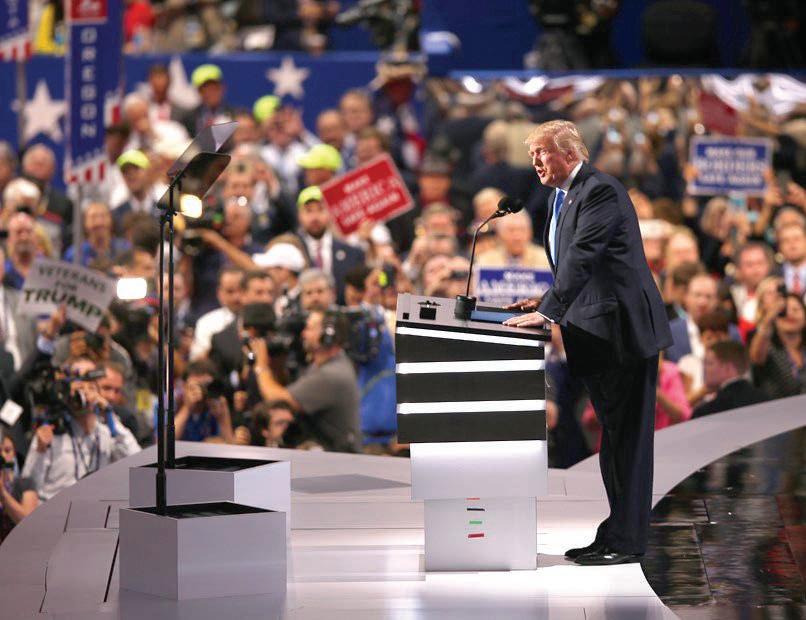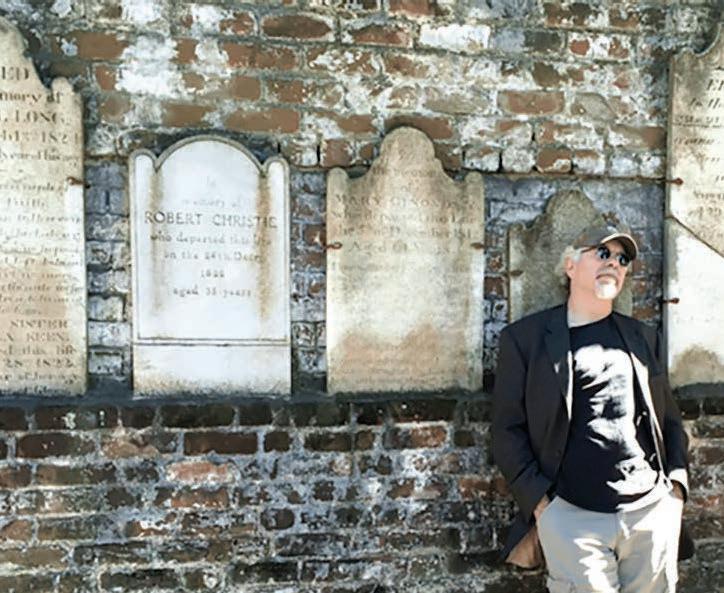
17 minute read
Upfront
TRUMP. BIDEN. CLEVELAND. DEBATE.
ON SEPT. 29, BARRING
Advertisement
unforeseen catastrophe or readily predictable coronavirus-related issues, Joe Biden will debate President Donald Trump in Cleveland, Ohio, at the Health Education Campus of the Cleveland Clinic (HEC). It’ll be the first televised presidential debate of the 2020 general election cycle.
The Commission on Presidential Debates announced early this week that the University of Notre Dame had withdrawn from hosting the first debate and that Case Western Reserve University and the Cleveland Clinic had stepped in to fill the void.
CWRU and the Clinic, who are collaborating on the hosting duties, also collaborated on the HEC, “where students in medicine, dentistry, nursing and related fields come together to learn and practice teambased care in simulated settings and, later, at actual clinical sites.” It opened last summer.
The debate, like those that will follow, is scheduled to run 90 minutes and will be televised on all the major networks. The nation will watch with rage or apathy. A live audience may or may not be present depending on future COVID data. Local protests can be expected.
-Vince Grzegorek
Speaker of the House Arrested, Charges Allege Biggest Racketeering Scandal in Ohio History
The U.S. Attorney’s Office in Columbus last week announced criminal charges against Ohio House Speaker Larry Householder, his aide Jeff Longstreth, lobbyist and former Ohio Republican Party Chair Matt Borges and others. The racketeering charges concern almost $61 million in payments related to a controversial energy bailout the Ohio General Assembly passed last year and was described as the largest racketeering scandal in Ohio’s history.
FBI agents arrested Householder, Borges, Longstreth, FirstEnergy Solutions lobbyist Juan Cespedes and lobbyist Neil Clark on the charges, which stem from lobbying activity around HB6. That bill funnels millions of taxpayer dollars to two faltering nuclear power plants and two coal-powered plants, while also rolling back the state’s renewable energy standards.
An unusual combination of fiscal conservatives, oil and gas companies, environmental groups and others decried HB6 which entailed payments by ratepayers of $150 million per year between 2021 and 2027 to Energy Harbor (formerly FirstEnergy Solutions), a bankrupt subsidiary holding two nuclear power plants — Perry Nuclear Power Plant outside of Cleveland and DavisBesse Nuclear Power Station outside of Toledo — owned by Akron-based parent company FirstEnergy Corp.
The federal affidavit detailed the complex system by which Householder and others received money from the nuclear plants’ owners and its subsidiaries, called “Company A” in the filing, to secure the House Speakership for Householder, to pass HB6 and to enrich Householder and his allies in the process. That system involved an organization called Generation Now, which investigators allege

Householder controlled.
“From March 2017 to March 2020, Householder’s Enterprise received roughly $60 million from Company A’s entities,” the charges read. “An exchange for payments from Company A, Householder’s Enterprise helped pass House Bill 6, legislation described by an Enterprise member as a billion-dollar ‘bailout’ that saved from closure two failing nuclear power plants in Ohio affiliated with Company A. The Enterprise then worked corruptly to ensure that HB6 went into effect by defeating a ballot initiative.”
That ballot initiative sought the recall of HB6. It was met with millions in ads and counter-petition efforts from pro-HB6 groups — some with alleged ties to Householder.
As an effort by anti-HB6 group Ohioans Against Corporate Bailouts to get the 265,744 valid signatures necessary to land a referendum on the state ballot kicked off last year, a group called Ohioans for Energy Security fired a salvo back at the law’s critics in the form of a 60-second commercial that began running in late August on broadcast and cable TV and radio. That ad accused natural gas interests of being behind the opposition to HB6 and further asserted that those interests represented an attempt by the Chinese government to take over Ohio’s energy grid — a claim many media outlets deemed misleading.
Neither Ohioans Against Corporate Bailouts nor Ohioans for Energy Security, which are both LLCs, disclosed who funded their campaigns.
Following last week’s revelations, Ohio Gov. Mike DeWine called for Householder’s resignation. Environmental groups and some Democrats have called for HB6 to be repealed. DeWine first called HB6 “good policy,” but backtracked, acknowledging that a law passed by corrupt means was itself corrupt. House Republicans met Wednesday to determine if they should remove Householder from power. He has refused to resign voluntarily.
-Nick Swartsell
Scene Files for Court Enforcement of TownHall’s Agreement to Dismiss Lawsuit and Pay Scene’s Attorneys’ Fees
We’re glad to finally be able to provide an update on the lawsuit that TownHall’s owner and general manager filed against us in June
First, the background:
In May, TownHall sued Scene over a report that temporarily, for about one hour, misidentified the target of a hateful and discriminatory Facebook comment made by TownHall’s manager Ryan Hartzell as a Black woman, when Hartzell had actually directed the remark to a Ukrainian immigrant who was a former TownHall employee.
Scene’s position on this lawsuit from the outset has been clear. First, that the substance of its report was substantially true — i.e., that TownHall’s GM made a hateful and discriminatory remark to a member of the public in response to criticism of the restaurant’s apparent disregard of public health guidelines in its “reopening” amidst the Covid-19 pandemic. And second, any harm caused by the alleged defamation couldn’t have possibly damaged TownHall’s or Hartzell’s reputation given both the hateful and discriminatory nature of the remark at issue, as well as numerous other developments, both past and current, reflecting far more negatively on the reputation of TownHall and its management than Scene’s temporarily and minimally inaccurate report possibly could.
As stated by our attorney, Peter Pattakos, the day the case was filed:
“This is a classic example of an abusive lawsuit by a wealthy business owner intended to silence negative reporting about his business. With the journalism industry as challenged as it is today, especially in Cleveland, the good news here might be that Scene is more likely to recover on counterclaims against TownHall than TownHall is to recover a penny against Scene.”
Pattakos’s prediction looks to have been correct. Only a few weeks after TownHall filed its lawsuit, our legal team had assembled a motion for summary judgment attaching evidence reflecting on TownHall’s reputation in the community, showing that it could not legally establish that it was damaged by Scene’s report. After Pattakos emailed TownHall’s attorney, Chris Congeni, a copy of this motion on July 1, TownHall and Hartzell agreed the next morning, July 2, to dismiss its lawsuit and make a donation to the Scene Press Club in the full amount of Scene’s attorneys’ fees.
Since then, TownHall owner Bobby George has suffered a case of buyer’s remorse, and in an apparent effort to continue to chill Scene’s reporting about his business activities, has refused to comply with the parties’ settlement agreement. While he has remained willing to make a donation to Scene in the full amount of its attorneys fees, he has insisted on Scene keeping the fact of the payment secret from the public, and has asked Scene to agree to other unacceptable confidentiality provisions and restrictions on its reporting.
Scene has explained to Mr. George, and also affirms to you, our readers, that such restrictions are unacceptable here. As our attorneys stated in our motion to enforce the settlement agreement that was filed with the court this morning, Scene’s journalistic mission requires vigilance against threats to its First Amendment rights, and to your right to be informed by our reporting. TownHall’s frivolous lawsuit against us represents just such a threat, and the settlement agreement reached by the parties, which guaranteed Scene’s right to announce that TownHall paid its attorneys fees, reflects the importance of these concerns.
We also affirm to you, our readers, that in our settlement agreement with the TownHall plaintiffs, we did not agree to keep any information about the plaintiffs confidential apart from the precise amount of the attorneys’ fees that they promised to compensate us for.
We remain committed to reporting on this and all matters of concern to our readers and expect that our settlement will shortly be enforced by the Court under clear Ohio law requiring the same. A copy of our motion to enforce, which includes the parties’ correspondence confirming the settlement, is below. We will of course keep you posted on further developments. -Vince Grzegorek
In Parma Discussions, Majority Favors Changing Name of Controversial Native High School Mascot
The majority of participants in two community conversations about the future of Parma Senior High School’s mascot, the “Redmen,” have favored changing the name. Residents, alumni and members of Northeast
Sadly, Our Well-Armed Militia Will Not Battle Tyranny at This Time
Fellow NRA members, Lorain County Chapter,
You may be aware that unidentified federal agents are abducting people off the streets in Portland, Oregon, holding them without charges. As Floyd Benson notes, this is precisely the tyranny we’ve been awaiting since this chapter was founded 63 years ago. At last night’s emergency meeting, he raised a motion to activate our well-armed militia.
The debate could only be described as “robust,” perhaps even “muscular.” Yet after lengthy deliberation, the board voted 8-1 not to battle tyranny at this time.
We realize some of you may be disappointed. And by no means should this be seen as a reflection of our willingness as a fighting force, nor as a dimming of our commitment to armed conflict. It’s just that unforeseen circumstances make our beliefs somewhat tenuous at this time.
Our reasoning is as follows:
LOGISTICAL CONCERNS
Though a block of seats was available on Spirit Airlines, they do not serve lunch, presenting undue risk to our members with Type II diabetes. Moreover, long arms, ammunition and tactical gear are not considered carry-on, requiring an additional payment of $50 per item.
Spirit also requires masks. The board concluded this would amount to our tacit approval of one tyranny only to fight another, which didn’t make any sense.
COMBAT READINESS
As you know, most of our training over the past few years has consisted of our annual reenactment of the Battle of Shiloh at the county fair and playing Call of Duty. While in no way are we calling into question the value of these exercises, they may not have adequately prepared us for a counter-offensive against federal forces.
We would also be fighting without many of our finest citizen-soldiers. Mike Gravelle tweaked his ankle playing softball last month. Ronnie Smolinski already promised his daughter she could take his AK for show-and-tell at Bible camp. And a sizable portion of our troops didn’t want to miss the VFW dart league playoffs, which start this week.
PROBABILITY OF MISSION SUCCESS
Though Floyd predicted federal retreat at our mere presence, others were less certain. Jack Foligno heard that Portland only has vegan restaurants, which would leave our regiment fatigued during a running firefight. Others were concerned the Motel 6 isn’t adequately fortified to repel an assault. Still others thought the idea of battle sounded “cooler” in theory, but was starting to sound “less cool” now.
As such, many members felt the conditions were “dangerous” and “scary,” though we settled on the official phrasing of “sub-optimal.” There was also grave concern about how late the liquor stores stayed open.
Yet as Tammy Dubnyk noted, the prospect of a new Biden regime should provide for way better tyranny down the road.
By another 8-1 vote, the board chose instead to host a pig roast at Jimmy McGovern’s place. Members will be invited to discuss their exploits had we actually gone to Portland. It will be BYOB. Jimmy asks that someone bring the macaroni salad.
Yours in freedom at some other time, Commander Jerry Graybo Ohio Native American organizations all provided commentary in a public Zoom call last week, and most of them believed that the name and logo should be retired.
Parma is Cleveland’s largest suburb and Ohio’s seventh-largest city. The school district, led by Superintendent Charles Smialek, has undertaken a process to gather feedback from the community about the mascot in light of national conversations around social justice and recent concerns voiced at a Parma School Board meeting. There will be one more virtual community conversation, in August, after which Smialek said he plans to engage students.
“We really have intended this process to be about a conversation and a sharing of perspectives as opposed to simply an announcement of our decision,” Smialek told Scene after the meeting. “To this point, with little exception, the meetings have been both passionate and respectful. We look forward to continuing this important dialogue with the community of Parma Senior High.”
The arguments to keep the name and those to abandon it are familiar to Clevelanders, who are watching a virtually identical conversation play out at the Major League level. The Cleveland Indians organization is following the Washington D.C. football team in likely parting ways with its name. (The Indians removed the Chief Wahoo logo from team caps and jerseys in 2018.) During their home opener last week, the Indians wore their Away jerseys, Blue with “Cleveland” lettering, as a statement to support the name change.
Just as in the Indians case, representatives from local Native organizations argued that the Parma team name causes social and psychological harm to Native Americans, particularly Native youth.
Joshua Hunt, Vice Chair of the local 500 Years of Dignity and Resistance group, said Thursday that not only do Native logos and mascots cause harm for Native students, they damage non-Native students as well by “filling their heads with stereotypes.”
Gina Wilkolak, a 2007 graduate of Parma Senior High who now lives in Richmond Heights, urged a name change, too. She referenced a recent change to the Berea-Midpark High School logo, a clenched white fist holding a lightning bolt, which some felt was reminiscent of a white power symbol.
“If Berea-Midpark can listen directly to people in the community who point out an offensive aspect of a logo, and something is done about it, then that can certainly be achieved in the Parma City School District,” she said. “If we want to inspire students to make the world a better place, we should be embracing the fight for social change.”
A 1973 graduate of Parma Senior High said that the name and logo had been “near and dear” to her years ago, but that she no longer agrees with it, having lived in other cities and more diverse neighborhoods. She said her adult children were “appalled” at the name. “We would never consider having a team called the Brownmen or Yellowmen or Whitemen, so why is Redmen okay?”
Parma’s current wrestling coach and 2013 alum Justin Halaska provided thoughtful perspective borne of his personal experience. He said that while he had fond associations with and pride for the name — he said he’d received Parma’s “Mr. Redmen” athletic award in high school — he also said he didn’t experience much racial diversity growing up in Parma and now understands he doesn’t have the right to tell anybody how or what to feel.
“If this is hurting Native Americans, then [the mascot] has to change,” he said. “It’s that simple, and I don’t think kids 20 years down the line are really gonna care. I really don’t. I understand that people say we live in a soft society or that we’re being too sensitive. But isn’t it okay to be more sensitive? To be more aware of how other people feel?”
Representing the opposing viewpoint, two Parma alums spoke passionately about keeping the Redmen name and logo. They argued, as supporters of Chief Wahoo long have, that calls to change the name were products of a politically correct society that took offense at everything.
“I call these people the perpetually aggrieved,” said one woman, who was later removed from the call for violating ground rules in the Zoom chat box. “They will complain about anything and everything. You don’t choose a [mascot] to be an insult to anybody. That’s just ridiculous.”
Several representatives from an organization called NAGA, the Native American Guardian’s Association, spoke in defense of the name and logo as well. The organization’s vice president, Tony Henson, said offensiveness was a door that swings both ways, and that while many Native Americans would be offended if the name were to be kept, “I would be offended if you got rid of it.” He referred to the abandonment of Native mascots as “cultural | clevescene.com | July 29-August 4, 2020 9


genocide.”
Sundance, the Executive Director of the Cleveland American Indian Movement chapter, told Scene after the call that while there was certainly more voices in favor of getting rid of the Redmen name last week, the first call was even more imbalanced. He said in that conversation, there was no opposition to the name change at all. -Sam Allard
Cleveland.com Erects Paywall, “Exclusive” Content Now Requires Subscription to Access
In a letter Saturday, Plain Dealer / cleveland.com editor Chris Quinn said that the 10-12 daily stories which have been tagged “Exclusive” for the last month will now be available only to paid digital and print subscribers. Despite Quinn’s previous insistence to the contrary, a paywall is now in effect.
Cleveland.com held out its hat for
DIGIT WIDGET
9 Weeks of remote leaning at all CMSD schools to start the 2020- 2021 academic year.
10 p.m. Time that bars must close in Columbus, per a recent order by the city council in Ohio’s capital city, to curb the spread of Covid-19.
30 Strikeouts by Cleveland Indians starting pitchers Shane Bieber (14), Mike Clevinger (6), and Carlos Carrasco (10), in the team’s opening series against the Kansas City Royals. Bieber’s 14 is the most by an opening day starter in the club’s history.
$1.845 million
Price, at auction, of Upper Deck LeBron James rookie card, of which only 23 were ever made. It’s the most ever paid for a single trading card, more than doubling the previous record high of $900,000 (for a Mike Trout rookie card.) “voluntary subscriptions” earlier in the pandemic, and at the time, Quinn went to great lengths to assure everybody that this was not a paywall.
“This is not a paywall,” he wrote. “Our coronavirus news and all of our other stories remain free. We are not cutting anyone off from the vital information needed to get through this ordeal. Your subscribing is simply an act of support for our work.”
That has now changed, at least for the content most readers value. “Exclusive” was a confusing label anyway, as many readers notes that virtually identical news reports appeared in other local outlets all the time. The dozen-plus stories per day, which may gradually increase to encompass more of the site’s original reporting and commentary, is perhaps better thought of as the site’s “premium” content. Quinn referenced both the recent reporting on the statehouse HB6 scandal and the output of veteran sports columnists in describing it. He said there would be no set formula for the designation of subscriber-exclusive content.
Advance Publications’ corporate position was always against paywalls. Its “digital-first” strategy, enacted at publications nationwide, entailed generating bushels of free content to jack up clicks in an effort to increase advertising revenue. The residue of that opposition means that “paywall” is still a dirty word and concept at cleveland.com. Quinn can’t bring himself to use it, though that’s exactly what he’s describing.
“You’ll get to read one ‘subscriber Exclusive’ story every 30 days without being signed in, but after that first one, you’ll have to be a paying subscriber signed into the site,” Quinn wrote Monday.
As with other businesses, including Scene, the coronavirus has been rough on cleveland.com’s finances. It’s perfectly natural that the site should erect a paywall to make money off its resourceintensive work. But unmentioned in all of Quinn’s columns is the degree to which The Plain Dealer had long subsidized the work of cleveland.com, and the exodus of print subscribers in the wake of Advance’s spring Gotterdammerung, when it killed the PD News Guild once and for all.
For those who’ve kept their print subscriptions, full digital access will be granted. Digital subscriptions, just like the voluntary subscriptions, will cost $10/month, or $100 billed annually. -Sam Allard





